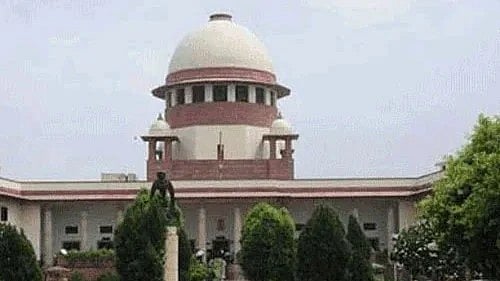
The Supreme Court of India.
Credit: PTI Photo
New Delhi: The Supreme Court on Wednesday commuted the death sentence awarded to a man from Ballari for killing his wife, sister-in-law and three children in 2017, to life imprisonment without remission, after noting that although there was a mixed views on whether he can be reformed or not but one favouring him must prevail.
A bench of Justices Vikram Nath, Sanjay Karol and Sandeep Mehta upheld conviction of appellant Byluru Thippaiah, alias Byaluru Thippaiah alias Nayakara Thippaiah, who suspected fidelity of his wife Pakkeeramma and killed her and her sister Gangamma and his three-children namely Pavithra, Nagraj alias Rajappa and Basamma on February 25, 2017.
"We affirm the findings of the courts below regarding the appellant-convict’s conviction for the barbaric and ruthless murders of his family members," the bench said.
Having gone through the evidence, the bench said, there is nothing on record which would discredit the case of the prosecution or expose any gaps, errors, conjectures or surmises in the chain of circumstantial evidence established by the prosecution, beyond reasonable doubt.
In the 23-page judgment, Justice Karol pointed out, not a shred of evidence either oral or documentary has been produced to posit appellant-convict’s innocence and bringing the possibility of involvement of third party in the case.
"We find no reason to take a different view on the appellant-convict’s guilt, than the one that has been taken by the courts below. This is keeping with the well-established principle of this court adopting a cautionary approach in interfering with concurrent findings of guilt," the bench said.
However, upon hearing senior advocate Gopal Sankaranarayanan for the appellant and Additional Advocate General for Karnataka Avishkar Singhvi for the state, the court noted the high court did call for behavioural and conduct report from the jail authorities, in terms of the Supreme Court's judgment in Manoj Vs State of MP (2023), but did not consider those appropriately and sufficiently, in view of the findings recorded in the said reports.
"Considering the sum-total of circumstances that drove the appellant-convict to this point of committing this crime of a most reprehensible nature, the death penalty may not be appropriate," the bench held.
The court noted lack of parental care, difficulties in learning in school leading to him dropping out, making impulsive decisions in business often leading to losses, breakdown of the marriage with his first wife for the reason that neither quite comprehended issues with substance dependence, as some of the factors pointed out in those reports.
It also found the appellant struggled with mental issues and twice attempted to take his own life during the incarceration.
Regarding possibility of reformation, the court said it can be said that given there is mixed opinion on whether he shall or shall not be able to reform his way, the court will err on the side of caution just as when there are two possible interpretations of a given set of facts or circumstances, the one that favours the accused is to be adopted.
The court thus held, "We are of the view that he should spend his days in jail attempting to repent for the crimes committed by him. As such, these appeals are partly allowed to the extent that he is released from death row. Instead, he shall await his last breath in prison, without remission."
